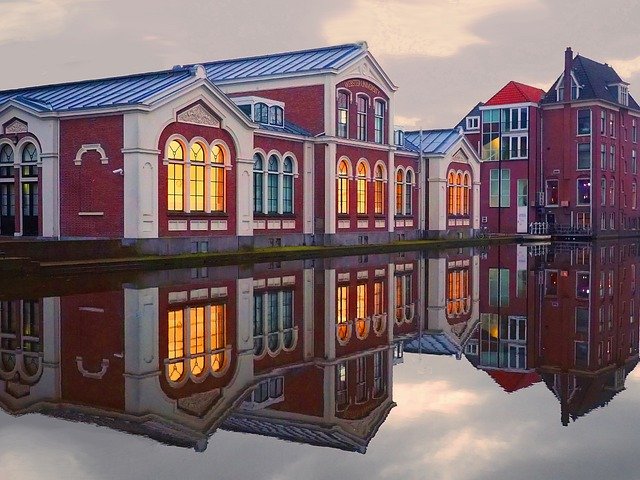The education system in the Netherlands is divided into four main parts: primary education, secondary education, vocational education, and higher education.
Primary education, also known as elementary education, is mandatory and lasts for eight years, starting at the age of four. Secondary education, which is also mandatory, is divided into two parts: lower secondary education (VMBO) and senior secondary education (HAVO or VWO). VMBO is a four-year program that prepares students for vocational education, while HAVO and VWO are five-year programs that prepare students for higher education.
Vocational education, also known as vocationally oriented education, is offered at vocational schools (MBO) and provides students with the skills and knowledge needed for a specific trade or profession. It typically lasts for two to four years.
Higher education in the Netherlands is offered at universities and universities of applied sciences (HBO). Bachelor’s and master’s degrees are awarded by both types of institutions. Additionally, PhD programs are offered at universities.
Overall, the Dutch education system places a strong emphasis on practical and vocational education, and allows students to choose a path that best suits their interests and career aspirations.
How is the Education System in the Netherlands?
The education system in the Netherlands is generally considered to be high-quality and well-organized. It is characterized by a strong emphasis on practical and vocational education, and allows students to choose a path that best suits their interests and career aspirations.
One of the unique features of the Dutch education system is the use of the “streaming” system, which allows students to specialize in a particular subject area or career path as early as age 12. For example, students can choose to focus on vocational education or choose academic path with different level of intensity.
The Dutch education system also places a strong emphasis on student autonomy and self-directed learning. Teachers act as facilitators, providing guidance and support to students as they work independently to achieve their goals.
The education system in the Netherlands is also known for its inclusive approach, which values diversity and promotes equal opportunities for all students.
Overall, the Dutch education system is known for its high-quality and innovative approach to teaching and learning, and is highly regarded internationally.
Preschool Education System in the Netherlands
The preschool education system in the Netherlands, also known as “peuteropvang” (toddler care) and “kinderopvang” (child care), is designed for children between the ages of 0 and 4. It is not mandatory, but it is widely used and highly accessible, with a large number of public and private preschools and daycare centers available.
Preschool education in the Netherlands is designed to provide children with a safe and stimulating environment where they can learn and develop through play. The curriculum emphasizes social and emotional development, language development, and physical development, as well as the introduction of basic concepts such as numbers and shapes.
Many preschools in the Netherlands follow the “Landelijk Pedagogisch Kader” (National Pedagogical Framework), which is a set of guidelines that outline the goals and curriculum for preschool education. The curriculum is flexible and allows for a range of activities and play-based learning experiences.
Preschool education in the Netherlands also places a strong emphasis on parent involvement. Parents are encouraged to stay informed about their child’s development and to participate in school activities.
Overall, the preschool education system in the Netherlands is known for its high quality and accessibility, and is designed to provide children with a strong foundation for their future education.
Why Is It Advantageous To Study Engineering In The Netherlands?

How to Get an Education Visa in the Netherlands?
To get an education visa in the Netherlands, you must first be accepted into a Dutch educational institution, such as a university or college. Once you have been accepted, you can apply for a student visa. The process for obtaining a student visa in the Netherlands generally includes the following steps:
- Gather required documents: You will need to provide several documents to the Dutch embassy or consulate, including proof of acceptance into a Dutch educational institution, proof of sufficient financial means to support yourself during your stay, and a valid passport.
- Submit your application: Submit your application for a student visa to the Dutch embassy or consulate in your home country. You will be required to pay a processing fee at this time.
- Attend an interview: You may be required to attend an interview with a consular official to discuss your plans for studying in the Netherlands.
- Wait for a decision: The Dutch embassy or consulate will process your application and make a decision on your student visa. The processing time can vary but usually it takes around 4-8 weeks.
- Obtain your visa: If your application is approved, you will receive your student visa, which will be valid for the duration of your studies.
It’s important to note that the process and requirements may vary depending on your country of origin, so it’s important to check the specific requirements and guidelines of the Dutch embassy or consulate in your home country.
It’s also important to note that some students may be eligible for a residence permit which allows them to work in the Netherlands. This permit is usually valid for the duration of the studies, and students can apply for them after they arrived in the Netherlands with a valid student visa.
How Much Are Foreign Language Courses In The Netherlands?
Tuition Fees in the Netherlands
Tuition fees for higher education in the Netherlands vary depending on the type of institution and the level of study.
For most students, the tuition fees for a bachelor’s degree at a Dutch university are between €2,000 and €10,000 per year. However, students from outside the European Union (EU) are typically charged higher fees, which can be as much as €15,000 per year.
Tuition fees for a master’s degree at a Dutch university are typically higher than those for a bachelor’s degree, and can range from €8,000 to €20,000 per year, with non-EU students paying the highest fees.
For vocational education (MBO), the tuition fees are generally lower, around €1,500 to €5,000 per year.
It’s important to note that starting from September 2021, Dutch universities are allowed to charge international students higher tuition fees than Dutch students.
It’s also worth noting that many scholarships and grants are available to students to help cover the costs of tuition and living expenses. Some scholarships are offered by the Dutch government, while others are offered by universities, private organizations, and foundations.
Overall, the cost of studying in the Netherlands is generally lower than in other countries like the United States or the United Kingdom. But for international students, it can still be relatively expensive, especially for graduate studies.
What is the Language of Instruction in the Netherlands?
The official language of instruction in the Netherlands is Dutch. Most educational institutions, including primary, secondary, vocational and higher education use Dutch as the primary language of instruction. However, many institutions also offer courses and programs taught in English, particularly at the higher education level.
International students studying at Dutch universities and universities of applied sciences have the option to study in English. Many universities and universities of applied sciences in the Netherlands offer a wide range of undergraduate and graduate programs taught entirely in English, catering to the increasing number of international students.
Most universities also offer Dutch language courses for international students to improve their proficiency in the language. It’s also common for universities to provide language support to non-native speakers throughout the course.
It’s also worth mentioning that many universities in the Netherlands have a large international community, which means that students from different countries can meet, interact, and learn from each other, which in return makes the experience more enriching.
Overall, while Dutch is the primary language of instruction in the Netherlands, many educational institutions offer courses and programs taught in English, especially at the higher education level, making it easier for international students to study in the country.
How Many Hours Is The Education System In The Netherlands?
The education system in the Netherlands is known for its flexibility and emphasis on student autonomy, which means that the number of hours spent in class can vary depending on the institution and the level of study.
In primary education, the school day typically lasts from 8:30 a.m. to 2:30 p.m. or 3:00 p.m., with an hour for lunch and two 15-minute breaks. The school week is typically five days, with some schools having an optional half-day on Wednesdays or Fridays.
In secondary education, the school day usually lasts from 8:30 a.m. to 2:30 p.m. or 3:00 p.m. with an hour for lunch and two 15-minute breaks. Secondary schools usually have classes from Monday to Friday, with some schools having an optional half-day on Wednesdays or Fridays.
In vocational education, the number of hours per week can vary depending on the level of education and the type of program. Some programs may require full-time attendance, while others may be part-time.
In higher education, the number of hours per week can also vary depending on the level of study and the type of program. Bachelor’s degree programs typically require around 30-35 hours of class time per week, while master’s degree programs typically require around 20-25 hours of class time per week.
It’s also worth mentioning that students in the Netherlands are encouraged to take responsibility for their own learning and to spend additional time on independent study and research.
Overall, the education system in the Netherlands is known for its flexibility and emphasis on student autonomy, which means that the number of hours spent in class can vary depending on the institution and the level of study.
Is It Possible To Live On A Nurse’s Salary In The Netherlands?
Educational Counseling in the Netherlands
Educational counseling in the Netherlands is a service that provides guidance and support to students at all levels of education, from primary to higher education. The main goal of educational counseling is to help students make informed decisions about their education and career paths, and to provide them with the necessary resources and support to achieve their goals.
In primary and secondary education, educational counseling is typically provided by teachers, school counselors, or guidance counselors. These professionals work with students to help them with academic and personal issues, such as study skills, time management, and motivation. They also provide information about different educational options and career paths, and help students plan their future education and career goals.
In vocational education, educational counseling is usually provided by teachers, trainers, and career counselors. They help students with career choices, offer guidance and support on how to find a job, and provide information about further education opportunities.
In higher education, educational counseling is usually provided by academic advisors or study counselors. These professionals work with students to help them choose the right program of study, make informed decisions about their education and career paths, and provide guidance and support throughout their studies. They also provide information about job opportunities, internships, and other career-related resources.
Overall, educational counseling in the Netherlands is a service that provides guidance and support to students at all levels of education. It helps students make informed decisions about their education and career paths, and provides them with the necessary resources and support to achieve their goals.

